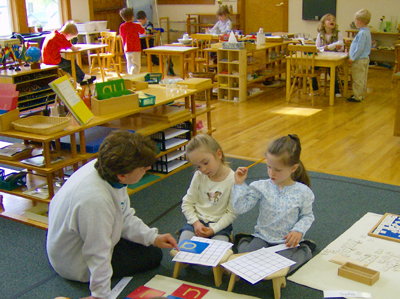 Public Elementary Classroom
Public Elementary Classroom
Montessori Environment
We are hearing a lot about educational reform lately and we in Montessori education need to lend our voice. I am always surprised that a nation of entrepreneurs and risk-takers has led education to such a state of conformity. We have brain-research that supports very different methodology and pedagogy than is used in most public schools, yet we keep trying to breath new life into an outdated system. We have had the same basic educational structure in the United States for the past one hundred or so years, yet the approach has changed very little. I realize I am preaching to the choir, however, pass along the information Dr. Steven Hughes has to share. He will be speaking at our school on March 4, and I believe he will have a book out soon. His website, goodatdoingthings.com, provides information on his brain-based, common sense approach to education. When we ask educators what they think is important to impart to children, and then key in on what they actually spend their time on, the disparity is amazing. We need to be like Montessori and rid ourselves of preconceived ideas and simply observe, ask questions, and be led to the answers by the unadorned truth. Dr. Hughes material is an excellent starting point. I've included one of his presentations. The video is simply the Power Point slides with his voiceover, which obviously does not have the same impact as Dr. Hughes in person, but it gives you a chance to hear the talk.

"Good at Doing Things" from Steve Hughes on Vimeo.
Dr. Steven Hughes
goodatdoingthings.com







![[Dennis_The_Menace080404.gif]](https://blogger.googleusercontent.com/img/b/R29vZ2xl/AVvXsEj9WuWgCfZ8KeF81IiI4Ya5Z61d5y8AO7Gc1YI06q2tl9ki5fmvtCR_rOHyB4viRk0zH3cmvoy-a9mSUUFYM4wUtyjB3NBOaaybuYkXQo7V4GFrnUnuK4brZaxSfkfcFm4WVHA-SOneBf1g/s1600/Dennis_The_Menace080404.gif)






